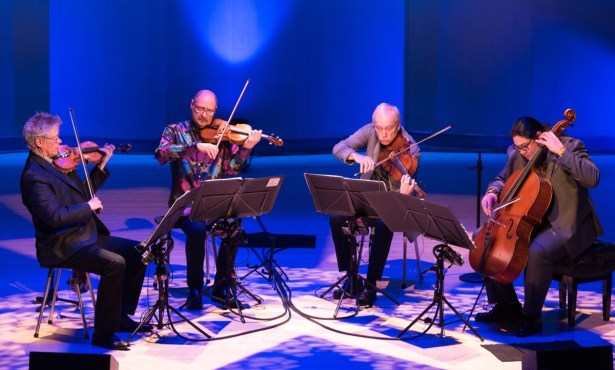Opera Santa Barbara Presents ‘Il Postino’
Poet Pablo Neruda Gives Advice While Exiled in Italy

Opera Santa Barbara (OSB) returns to the Lobero Theatre this weekend with another exciting production, Daniel Catán’s Il postino (The Postman). Two recent OSB efforts, Eugene Onegin and The Crucible, both in spring 2019, showed how well the company has taken the measure of this jewel of a venue and discovered a vein of material that suits the space perfectly. Based on the popular 1994 film, Il postino premiered at the Los Angeles Opera in 2010 in a grand production organized around superstar Plácido Domingo in the role of the poet Pablo Neruda. This version, tailored to the fetching lineaments of the Lobero by maestro Kostis Protopapas and director Crystal Manich, ought to be more intimate and just as ravishing.
Composer Catán — who died unexpectedly at age 62 in April 2011 — was a trailblazer. The first Mexican composer to have an opera produced in the United States, Catán wrote the libretto as well as the music for Il postino, which is sung in Spanish. For Protopapas, Il postino represents another step on his mission to establish Santa Barbara as a known center for refreshing productions of 20th and 21st century operas. For Manich, who has become an international leader in bringing Spanish-language operas to the stage, directing Il postino follows on a successful OSB debut in 2017, when she helmed The Cunning Little Vixen at the Granada.

The romantic story combines elements of Cyrano de Bergerac with details of the real life of Chilean poet Pablo Neruda. The poet’s exile was in fact to nearby Argentina, but in this version, as in the movie, Neruda (Raúl Melo) instead travels to a small island of the coast of Italy. That’s where he meets and befriends the lovelorn postman of the title, Mario Ruoppolo (Daniel Montenegro). After learning about love, rhyme, and metaphor from Neruda, Mario is able to win the heart of Beatrice (Sarah Vautour). The pair marry at the end of Act II, and Neruda returns to Chile, only to be recalled to Italy when Mario follows further in his footsteps by becoming a dissident author calling out the injustices of the oppressive Italian government.
The blending of so many cultural contexts — Neruda was a major figure on the left in Chile, and Italy has always had more than its share of internal divisions — comes naturally in opera. One need only think of the Italian-speaking ancient Egyptians of Verdi’s Aida, or the equally Italianate 49ers of Puccini’s La fanciulla del West to remember that history and opera often do strange things to one another. What does stay constant, however, in Il postino at least, is the exquisite matching of sound to sense, here enhanced further by the delicious post-Romantic melodicism and color palette of Catán’s score.
The underlying message of the piece would seem to be the value of having a sponsor in life, someone with whom to share one’s desires and from whom one can learn to express them effectively. Neruda’s influence on Mario captures the multifaceted impact of literacy in a world too often dominated by force and the status quo. To be a lover means struggling to be worthy of the beloved, but it also means coming into one’s own mature identity, whatever the eventual cost.
Tenor Montenegro knew the composer Catán well; he was the original Mario when Catán was working on the score at his home in San Diego. Since then, Montenegro has sung Mario opposite Domingo in Paris. Melo, who will sing Neruda in this production, is a nine-season veteran of the Metropolitan Opera in New York. His depth of experience and commanding tone are certain to make his portrayal of the great poet memorable.
4•1•1 | Il postino shows Saturday, March 7, 7:30 p.m., and Sunday, March 8, 2:30 p.m., at the Lobero Theatre (33 E. Canon Perdido St.). See operasb.org or lobero.org or call (805) 963-0761.




You must be logged in to post a comment.